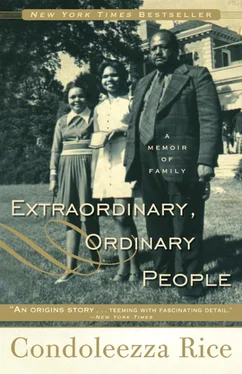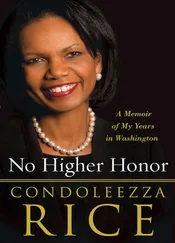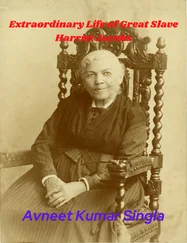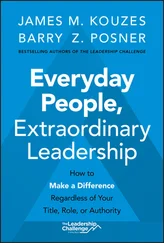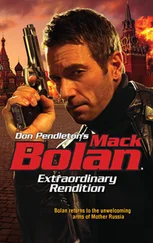My mother also made sure that I watched Mighty Mouse , in which the heroic mouse sang, “Here I come to save the day!” Mother explained that this was a form of opera in which dialogue is sung, not spoken. She seemed to find high culture in just about everything.
But my favorite show was The Mickey Mouse Club , which we watched as a family every day after school. All three of us would put on our mouse ears and sing, “M-I-C (See you real soon) … K-E-Y (Why? Because we like you) … M-O-U-S-E.” It was a real family ritual, not to be interrupted by anything. One day Mr. Binham the insurance agent was in the living room pitching my parents on some new policy. He was the only white man I can ever remember coming into our house in Titusville. In any case, it was about time to sing the Mickey Mouse song, and I was becoming agitated that my parents were otherwise occupied. Daddy politely told Mr. Binham that he’d have to wait. We put on our mouse ears and engaged in our family ritual. I felt very proud that my parents had put our time above whatever business it was they had with Mr. Binham. This small gesture was simply one of the many that communicated they always had time for me.
After The Mickey Mouse Club we would take a break from television for reading time and, as I became older, doing homework together. We would then tune into the nationally televised news program The Huntley-Brinkley Report . My father would comment on each story, explaining the historical significance of big events. I remember watching John Glenn’s historic mission to space, which preempted all other programming for the entire mission. For a while I wanted to be an astronaut, as did most of my friends. We’d load up our “space capsule” out in the backyard, with some lucky kid getting to be the astronaut and others being confined to earth as ground controllers.
But one of my most vivid childhood memories is the Cuban missile crisis in October 1962, in which the United States and the Soviet Union engaged in a tense standoff over the placement of Soviet missiles in Cuba. We were glued to the set every evening during those thirteen days. It was a very scary time. We’d never bothered with a bomb shelter in the house, even at the height of the Cold War. But some of our friends did have them, fully stocked with provisions to survive a nuclear exchange. In school, we went through duck-and-cover drills. When the alarm sounded all the children fell to the floor, huddling under their desks. My friends and I even played bomb shelter, crawling into the little space just beneath the house in response to a “nuclear attack.”
But the crisis in Cuba was no drill. Because the missiles would have been deployed just ninety miles from the Florida coast, the newscasters reported, probably incorrectly, that Birmingham was in range. They showed big arrows pointing right at us. I could tell that my father was worried, and I realized that this was something my parents couldn’t save me from. It was the first time that I remember feeling truly vulnerable.
Daddy explained that our country had never lost a war, and he was sure we weren’t going to lose this one. He was nevertheless visibly relieved when the Soviet ships turned around, ending the crisis. The whole episode had a surprisingly strong impact on me. I once told an audience of Cuban Americans that Fidel Castro had put the United States at risk in allowing those missiles to be deployed. “He should pay for it until he dies,” I said. Even I was surprised by the rawness of that comment.
After our move to 929 Center Way, my parents set about building a solid and enjoyable life for our family. Each day my father would drop me off at my grandparents’ and Mother and Daddy would come together after school to pick me up. Granddaddy still worked a pretty full day, and my grandmother was a full-time homemaker. I’d “help” her around the house and watch soap operas with her. She loved As the World Turns , and I loved the commercials, especially for Tide and Mr. Clean, which made stains disappear right before your very eyes.
Sometimes Daddy would pick me up early to go to a high school football game at Rickwood Field, the somewhat dilapidated stadium at which black high school teams played their games. According to Grandmother, I would become so excited at the prospect of going to a game that I would pester her all day about the time. “When is it going to be two o’clock?” I would ask over and over. My exasperated grandmother finally showed me a clock and the position of the hands at two o’clock so that I could track the time myself. I guess I can thank football for helping me learn how to tell time.
But the activity that I enjoyed most was watching my grandmother teach piano. Grandmother Ray had about twenty students, ranging from beginners to quite advanced pianists. Her lessons started at about three o’clock every day, and she taught for a couple of hours, charging twenty-five cents a session. When the students would leave I’d go to the piano and pretend to play, banging at the keys and “reading” the music. Then I’d ask to take some sheet music home so I could “practice.” Each day I’d leave with music, usually forgetting to bring it back the next day. To preserve her music collection, Grandmother finally gave me a regular book to take home. “Grandmother, this isn’t music!” I told her.
Grandmother Ray decided that it was unusual for a kid to know the difference and asked my mother if she could start giving me piano lessons. I was three years old, and they wondered if it might be too early but decided to give it a try. Unlike the early experiment with first grade, this worked. I loved the piano.
Grandmother started every student with books of exercises that trained young fingers to do progressively more difficult things. Each student also learned a prescribed series of increasingly more difficult hymns, starting with “What a Friend We Have in Jesus.” My parents had bought a little electronic organ for our new house, and I’d play for hours when we got home. They claimed that it was hard to get me to do anything else, including read books or watch television. But a problem emerged as I began to play hymns: the little organ did not have enough keys. Each time I wanted to play low notes, I was out of luck.
“I need a piano,” I told my parents several months into my lessons.
Daddy made me a deal. “When you can play ‘What a Friend We Have in Jesus’ perfectly, we will buy you a piano,” he said.
The next day I went to my grandmother’s and sat at the piano for eight hours, not even wanting to break for lunch. I practiced and practiced, and when my parents came to pick me up I played “What a Friend” perfectly!
As they’d do many times in my life, John and Angelena found a way not to disappoint. They didn’t have the money to buy a piano, but they rented one the next day from Forbes Piano Company. By the end of the week I had a brand-new Wurlitzer spinet.
I became good at the piano very quickly and started to play publicly. Mother found opportunities for me to play at various church functions as well as citywide events. I played several pieces at the gathering of new teachers in 1959, where I was decked out in a gray polished cotton dress with pink flowers, black patent shoes with rhinestones, and a white fur hat. I don’t remember being nervous and have always thought that these early experiences helped me to overcome any sense of stage fright.
My mother reinforced my inclination toward music in multiple ways. She’d buy books written for children about the great composers. I imagined what it would have been like to meet Beethoven, who scribbled musical notations on tablecloths, or Bach, who fathered twenty children. My favorite story was about Mozart’s life. I was totally enchanted by this man who had written so much and died so young, at the age of thirty-five. I even developed a little crush on him, imagining myself as his wife, Constanze. Admittedly, this was a strange infatuation for a little black girl in Birmingham. Most of my friends were in love with Elvis Presley.
Читать дальше
